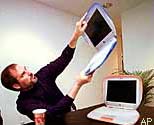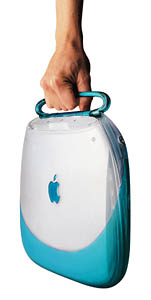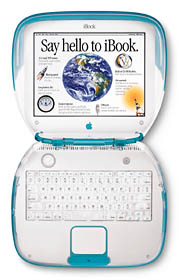
 For
some time Apple has only produced laptop computers that by their pricing meant
that only corporations would buy them for their executives. Certainly some people
purchased G3 versions of the PowerBook for use at home and on the road but
the market share has fallen to 2% Macintosh. Using the experience Apple
learned with the production of the eMate a keyboard education version
of the now discontinued Newton, Apple's founder Steve Jobs, announced their
newest
portable computer, the iBook at MacWorld Expo in New York.
For
some time Apple has only produced laptop computers that by their pricing meant
that only corporations would buy them for their executives. Certainly some people
purchased G3 versions of the PowerBook for use at home and on the road but
the market share has fallen to 2% Macintosh. Using the experience Apple
learned with the production of the eMate a keyboard education version
of the now discontinued Newton, Apple's founder Steve Jobs, announced their
newest
portable computer, the iBook at MacWorld Expo in New York.The iBook is of course strongly influenced in design by the extraordinarily popular iMac which has now reached the 2,000,000 mark in sales as it nears its first year of life. It is even referred to as the portable version of the iMac however it is much more then that. It shares the 300Mhz processor of the iMac, has a 3.2GB hard drive, uses

the same RAM as the iMac, has a 56K modem, 24x CD, 32MB of RAM and sports a snazzy 800x600 active matrix 12.1" screen. But those specifications really only describe some of its characteristics.
The design of the machine itself is going to determine its popularity and usability. The case is made of a bullet proof material has a handle on its hinge and its clam shell construction is spring loaded so there is no catch to release when opening it and it comes to life when this happens. The internal lithium battery has a six hour operation endurance and the AC power cable is lawn mower pull rope retracting from the box. The full size keyboard includes "F" keys and inverted "T" arrow keys with function designation on those "F" keys that will launch applications.
It has one USB port, an ethernet jack, a PowerBook SCSI adapter but interestingly enough, no built in microphone. The jacks and ports are not covered with fragile doors but are right on the box.
The iBook looks functional and above all rugged and durable which would be a departure from many laptops including Apple's 1400 series. But there is an interesting twist to this product. As its name indicates the "i" part of it indicates that it was primarily designed with the use of the Internet in mind, just as was the iMac but here is where the iBook breaks new ground. A option card is designed for the machine that uses Lucent Technology's wireless capabilities. Used in conjunction with an "AirPort", a book that essential acts like a wireless hub the iBook can access the Internet or file share up to 150 feet from the Airport box which in turn will support up to ten iBooks or other computers for that matter as there are PCI cards available for other computers.

Macintosh dealers have wanted a product like this one ever since they saw the eMate (sold only in the education market by education dealers) and realised the potential uses for a computer that could be used in all sorts of environments, would be capable of networking and have the strength and stamina to serve as a working tool. The beauty of this little beast is that it is the same quick speed of an iMac using ATI Rage technology to update the screen and be able to be expanded with more memory thus being able to use what ever software the user needs for their work or play.
Apple will begin shipping iBooks in September and they come with a nice set of software including AppleWorks 5. This means that the purchase of the machine means that you have all you need other then an Internet account.
When you consider that just being a Macintosh, the computer is assured of years of use as 1986 Macs continue to be used every day and with each successive release of system software the computer increases its capability. The iBook will ship with 8.6 installed but within a month Mac OS 9 will be available offering new features included outstanding improvements to the already miraculous Internet search application "Sherlock".
The advertised price for the new iBook is $1,599 US but the pricing we at FTLComm got today for small Apple dealers like ourselves placed the price at $2,545 and large retail outlets will offer below that price. The "AirPort" card will come to $179 Canadian and the "AirPort" access Port is $513.